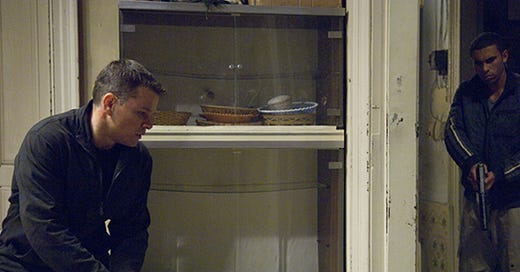Heroes of the Zeroes: The Bourne Supremacy / The Bourne Ultimatum
Heroes of the Zeroes is a daily, alphabetical look back at the 365 best films from 2000 to 2009. Today's entry counts as two films.
"The Bourne Supremacy" / "The Bourne Ultimatum" Rated PG-13 2004 / 2007
The loss of his voice notwithstanding, Matt Damon would be fine were his windpipe crushed or his mouth forced shut by lockjaw.
Since “Good Will Hunting,” Damon has relied little on the toothy best-pal grin, boyish good looks or Bahstin accent that made him a star. And particularly — in the latter two “Bourne” films — he projected believable urgency and turmoil in his brow, walk and eyes to suggest something simmering beneath the surface.
The idea that ghostly spies like the seemingly indestructible Jason Bourne are haunted too, and with such stillness, allowed this franchise to move beyond 2002’s “The Bourne Identity’s” indifferent, self-conscious coolness.
2004’s “The Bourne Supremacy” and 2007’s “The Bourne Ultimatum” riveted as rides through both exotic locales and the grim hell of Jason Bourne — an amnesiac superspy plagued by what he can’t recall and targeted by people he’d like to forget.
As Bourne seeks to uncover his past and bury those who would cross him, director Paul Greengrass masterfully blends sight, sound and silence to do much more than entertain: These films leave a deep psychological imprint.
Vibrant and vital, Greengrass’s trademark fleeting, darting camerawork forces viewers to scan scenes with Bourne’s eyes, and inhabit his jittery uncertainty of who might swing around a corner or peek from behind a rafter.
Both films teem with sit-up straight action. Bourne’s anger and several barrels of petrol fuel a car chase to rival “The French Connection” in “Supremacy.” “Ultimatum’s” gritty, gutsy centerpiece transports viewers to Morocco for a chase on foot, mopeds and rooftops that concludes in an exhilarating, exhausting spit-and-sputter grapple in a tenement bathroom.
Plus, for a pair of movies about manipulated information, Greengrass unleashes one bit of wily misdirection late in “Ultimatum” with a bold chronological overlap to “Supremacy.”
“Supremacy” and “Ultimatum” also allow crafty, classy character actors like Joan Allen and David Strathairn compellingly verbal toe-to-toe confrontations. In particular, Strathairn’s declaration that “It ends when we’ve won!” rings out as a vague, shapeless statement chillingly relevant to the political uncertainty of the films’ times.
And it’s no mistake that the tip of someone’s desktop flagpole appears so pointy. Together, the films build up to a big question of what’s worth throwing on the grindstone to keep sharp the weapons of U.S. self interest? Wrangling patriotism back to the right side of purity and perversion becomes an imperative in these two films, and its resolution arrives with both raging adrenaline and somber penance. (Bourne’s stated Catholicism? No mere coincidence.)
Throughout it all, Damon boasted an expression of clenched, nearly teary exasperation. His raw rage was, in part, our own, and it screeched as loudly as all the motorcar metal and metropolitan mayhem that was unleashed.



